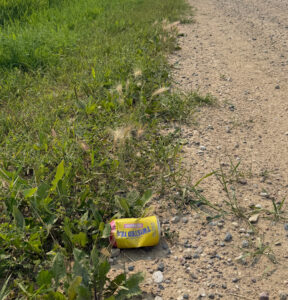Kim G C Moody’s Musings – 1-1-1 Newsletter For August 6, 2025
One Comment About Taxation – Should Canada Follow the New U.S. Law That Exempts a Portion of “Tips” Income From Taxation?
Early on in my career, I started going out for lunches and dinners with key contacts and clients. Of course, as I learned earlier in my life, providing gratuity (“tips”) for good service was customary. I wondered if it was a requirement for the servers to pay tax on their received tips. The short answer is “yes”. Today, the “tipping culture” is overly excessive, but that’s a rant for another day.
I also learned that the reporting of tip income by recipients is very inconsistent and the subject of myths. A number of people, even seasoned tax professionals, would tell me – and continue to do so – that as long as the recipients “reported something, say 10% of their wage” that the Canada Revenue Agency (CRA) would leave them alone”. Nope. Not true. And never has been. The CRA has a long history of providing administrative guidance about the requirement to report tip income. And for employers, especially if the tips are originally in the control of the employer, the CRA has provided guidance regarding proper tax withholdings from such amounts. Tips are indeed taxable income and need to be reported in their entirety.
For the recipient, there are often good reasons to fully report your tip income.
The first is that by purposely not reporting it, you’re breaking the law. In a worst-case scenario, such failure to report could be considered criminal tax evasion resulting in significant financial penalties and possible jail time. Don’t purposely under-report.
Second, the reporting of your tip income can possibly make you eligible for certain types of government programs. For example, I’m aware of some servers who didn’t report their tip income and when COVID came with all of its handouts, their income was too low to qualify for the handouts.
Third, reporting your tip income increases your RRSP contribution room and future Canada Pension Plan payouts.
And, lastly, the reporting of your tip income can assist with increased income for purposes of loan / mortgage eligibility.
A basic policy in the design of any country’s tax system is that any economic enrichment received by a taxpayer is taxed. The exceptions to such a basic rule are what causes many of the complications. For example, in Canada, lottery winnings are not taxable; capital gains are only one-half included in taxable income; dividend income received by individuals are taxed at a lower overall rate (to give credit for the underlying corporate tax that has already been paid on such distributions) and many more examples. These are all deliberate policy choices made by Canada.
Tip income has intentionally not been excluded from being subject to tax in Canada. I think that is correct. There are no good and obvious policy reasons to exclude tips from tax.
So, during the U.S. election campaign of last year, I was surprised that Donald Trump promised to introduce a rule to not tax tips and overtime for U.S. purposes. I guffawed at such a promise since, again, I couldn’t understand any good tax policy reasons to do that. I also wondered how such a law, if implemented, would be administered. And to what occupations such an exclusion would apply. For example, perhaps a lawyer could issue an invoice for services rendered for $100 but mandate a non-taxable “tip” of $100,000. Would the law encourage that kind of abuse?
Fast forward to the implementation of President Donald Trump’s “One Big Beautiful Bill” that became U.S. law on July 4, 2025. It implemented the election promise but didn’t go as far as a free pass on all tips. It also implemented limited non-taxability on overtime pay as well…more on that in the Economics section below.
Under new IRS code section 70201, for 2025 through 2028, employees and self-employed individuals may deduct up to $25,000 of “qualified tips” (voluntary cash or charged tips received from customers or through tip sharing) received in occupations listed by the IRS as customarily and regularly receiving qualified tips. For self-employed individuals, the deduction can not exceed their net income. The deduction phases out for those who have adjusted gross income in excess of $150,000 ($300,000 for joint filers).
The IRS has not yet provided its list of occupations that “customarily and regularly” receive tips and has until October 2, 2025 to do that. Obviously that list will be narrow so as to try to curtail some of the abuses that could be done as illustrated in the example above.
Should Canada do something similar? No. In my opinion, the new U.S. rule is very silly and a blatant example of politics driving tax policy for votes. Does it make any sense that a person who customarily receives tips should not pay tax on such amounts whereas a person working in another industry – like a retail sporting goods store – will pay tax on their compensation? No, it makes zero sense. If that makes sense to you, well, I have a bridge for sale down the street. Let’s chat.
While there are obvious administrative benefits to exempting tips from tax (tips are usually small dollar amounts and can be a nuisance to track) and equity arguments (tips are often earned by lower-income people so exempting such tips from income tax can perhaps improve equity), the real risk is the erosion of the tax system. In other words, instead of relying on existing exemptions and credits to exempt / reduce lower-income households from tax, the no-tax on tips would encourage no-tax on other types of income. It would be a slippery slope.
As former U.S. President Ronald Reagan once quipped, “The most terrifying words in the English language are: I’m from the government and I’m here to help.” Is the U.S. government, “helping” by complicating their tax laws with non-principled carve-outs that are not grounded in good tax policy? If Canada followed suit, what’s next?
The tax system works best when it’s clear, consistent, and based on sound policy, not vote-hunting gimmicks. Canada should keep tips on the serving / “tax” table.
One Comment About Leadership – “Bottles and Cans Leadership”
On a recent trip to visit my mother-in-law in a remote northern Saskatchewan community, I went for a long walk along a gravel road. The landscape was stunning with wide open skies, endless fields of grain growing but it was also dotted with something less beautiful: discarded bottles and cans littered along the roadside.
At first, I was disappointed. But then, I was reminded of my childhood.
Back then, my siblings and I collected bottles and cans for pocket money. We’d scan ditches, fields, and alleyways – places others ignored – always on the lookout for hidden value. What others threw away, we turned into opportunity.
That childhood “hustle” eventually faded as we moved into part-time jobs and more traditional paths. But the mindset stuck with me: the ability to see potential where others see waste, to explore paths that others overlook, and to find value in unexpected places.
As a leader, that instinct has served me well. I’m still scanning the edges, watching for opportunity, and digging where others don’t. And I remain deeply grateful for those early lessons and for the abundance and opportunity that life has since provided.
Leaders, what were your “bottles and cans” moments? What hidden places did you once explore and what did they teach you about leadership today?

One Comment About Economics – The Economics of Overtime Work
Over the years, I have had many discussions with employees – especially trades workers – who complain about overtime. “It’s not worth it for me to work overtime…they tax me more than I earn!” is surprisingly some of the common comments I hear. Well, that’s simply not true. If personal marginal tax rates exceeded 100%, then that statement would be true.
However, in provinces such as Ontario, Quebec, the Atlantic provinces and British Columbia, the highest personal rates are approximately 54% leaving 46 cents on each dollar in the pockets of people who are in that tax bracket and work overtime. Is that appropriate? No….and I’ve previously discussed that in a previous newsletter. Given such, I certainly understand and
Like no tax on tips described above, Donald Trump campaigned in 2024 to not tax on overtime in response to many people who get frustrated with excessive tax on overtime hours. Again, I guffawed at the promise to not tax overtime since there is no good policy to do so. For example, why would overtime not be taxed but people who work on flat salary (with no overtime entitlement for “extra” hours worked) are still taxed fully on their salary? Again, if you can come up with a good policy reason for this, then I have a bridge for sale down the block. Let’s chat.
Similar to the tax deduction on tips, the One Big Beautiful Bill introduced a limited no-tax deduction for overtime. New Internal Revenue Code section 70202 implements the election promise so that for 2025 through 2028, individuals who receive “qualified overtime compensation” may deduct the pay that exceeds their regular rate of pay (such as the “half” portion of “time-and-a-half” compensation) that is required by the Fair Labor Standards Act (FLSA) and reported on a Form W-2, Form 1099, or other specified statement furnished to the individual. The maximum annual deduction is $12,500 ($25,000 for joint filers) and phases out for taxpayers with modified adjusted gross income over $150,000 ($300,000 for joint filers).
This kind of stuff is wholly ridiculous with no policy underpinning. And the potential to cause significant economic distortions.
Like the taxation on tips, Canada needs to stay away from this kind of stuff.
Bonus Comment – Quote From Thomas Edison – Eminent American
“Opportunity is missed by most people because it is dressed in overalls and looks like work.”
Totally agree! Leaders, are you open to Bottles and Cans Leadership?
Hope you enjoyed this edition of 1-1-1. If you’re not already part of the In the Mood Network, now’s the time. Please sign-up today. Whether it’s through consulting, coaching, speaking, or writing, my work is about planting acorns: deliberate, principled actions that challenge the status quo and grow into something far bigger. The goal? Bold reform. Stronger foundations. And a country that values hard work and common sense.



